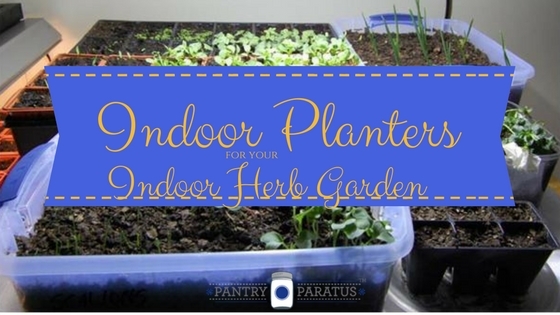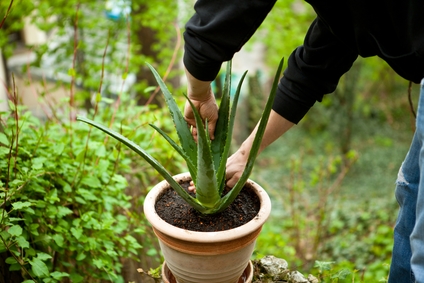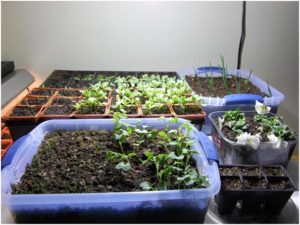
An important thing to consider when constructing your indoor herb garden, is figuring out what sort of indoor planters to use! This is where you can have a lot of fun actually, because your indoor planters don’t necessarily need to be typical planters. You can use anything that will hold dirt/water without making a mess – though you do need to consider drainage in many situations.
From a beginner’s point of view, simply getting regular pots is probably the better option. A regular terra cotta or ceramic type pot with a drainage plate to hold it is typical.
What You DON’T Need to Consider Indoors
It is preferable to have different types of plants in separate pots – especially since we are indoors. You might read that basil grows better next to tomatoes, but this is really for outdoor growing – where doing so can keep down the bugs. However sine we are indoors, we don’t need to worry about pests as much.
Growing Into It
Some people will start with smaller pots, then move plants to larger indoor planters. I prefer to acquire a planter that will match the size of the plant as I wish it to become – this is to avoid replanting which can be especially rough on delicate herb plants.

You might be able to replant a tree or a flower if the plant gets too big for the pot, but doing so can kill your herb – so I find it better to get a larger planter at first. Judging the correct size can be a challenge at the beginning – I can provide some good suggestions, like a 12×12 for a couple garlic plants, or a basil plant is a good starting point. From there you can grow in that pot and see just how big it gets. IF it doesn’t get big enough, then grow your next plant in a larger space – or if it gets too big, then grow your next plant in a smaller space.
Experience will be your best friend here – and the advice when starting out is to just pick a pot and go with it – don’t worry about size too much.
Your Best Options for Drainage and Weight
Drainage is of course critical, so when starting out I highly recommend only acquiring planters which drain – your typical pot is the example of that. You don’t want the roots sitting in water – but you also don’t want to underwater out of fear of drowning the plant. All about balance which you can judge after having a little experience.
 If you are going for very large indoor planters (as an example, I have a 24×24 large pot) – then I recommend going with fiberglass planters that look like a ceramic or terra cotta style planter. Their appearance is very realistic, but with a fraction of the weight. Filling up a large terra cotta planter with dirt can be VERY heavy – and quite potentially undesirable for moving around indoors.
If you are going for very large indoor planters (as an example, I have a 24×24 large pot) – then I recommend going with fiberglass planters that look like a ceramic or terra cotta style planter. Their appearance is very realistic, but with a fraction of the weight. Filling up a large terra cotta planter with dirt can be VERY heavy – and quite potentially undesirable for moving around indoors.
Poly resin, fiberglass, concrete, ceramic, metal, terra cotta – these are all options for materials of an indoor planter. Shapes and sizes of all kinds can be found as well. Consider the space you have available – even if you have very tight space, it is likely that you can find a solution – don’t let it keep you back.
Frugal & Fun Ideas
One could create indoor planters out of old coffee cups for example. Imagine planting some small herb plants in old coffee mugs, then hanging those from the ceiling. Instant indoor herb garden! And you don’t even loose valuable counter space! I’ve even seen a planter made out of an old CAMERA – the insides were hollowed out then filled with dirt – presto-chango, you have a unique herb pot. Think about enclosed items that you might have sitting around which you don’t need anymore – as long as they can hold dirt and water without making a mess, then you have yourself an indoor planter.
 One thing to keep in mind when getting creative with planters like coffee mugs, old pots, buckets, and unique items like cameras, is that they won’t have any drainage built in (unless you drill a hole). This isn’t necessarily a problem. However I don’t recommend taking this route unless you are experienced with growing herbs. It is possible to keep plants properly hydrated within a planter that does not have draining – but it requires a certain level of understanding and awareness about the state of the plant and the dirt it is in. Remember, roots sitting in water will rot – and that equals the death of the plant.
One thing to keep in mind when getting creative with planters like coffee mugs, old pots, buckets, and unique items like cameras, is that they won’t have any drainage built in (unless you drill a hole). This isn’t necessarily a problem. However I don’t recommend taking this route unless you are experienced with growing herbs. It is possible to keep plants properly hydrated within a planter that does not have draining – but it requires a certain level of understanding and awareness about the state of the plant and the dirt it is in. Remember, roots sitting in water will rot – and that equals the death of the plant.
So as we can see, there are a multitude of options for indoor planters when creating an indoor herb garden. You don’t have to be limited by round pots on a windowsill – though it is a good place to start when you are inexperienced.
About the Author: Richard Clayton
I’m an owner of a small gardening shop. I love gardening, especially lawn care. I can spend all of my free time taking care of my lawn and discuss about lawn care experiences with my friends, who have the same hobby as me. www.lawnmowertips.com is a playground of us, where we can discuss everything about lawn care techniques.

Great Post, Thanks for Richard Clayton’s sharing so much !
Thanks Jack
Very nice article. I’ll use some tips for my indoor garden 🙂
Thanks Ivey for reading!
Thanks for the tips and ideas! I’d love to have fresh herbs in my home but I wasn’t sure where to start from 🙂
Thanks a lot for reading, Bethany 😀
Your article about containers is interesting to me because I need to be inventive in finding containers to fit unusual spaces, including narrow ones. I wonder how you make holes in the bottom of most lightweight containers that don’t have them. Does an awl work or do you need to have an electric drill?
I like the idea of a large container for planting a medley of herbs. Will they grow in front of a large West-facing window? Thanks for your fine advice.
I really enjoyed your article on indoor herb gardens as i grow my own herbs for tea. t was very informative and thank you for sharing.